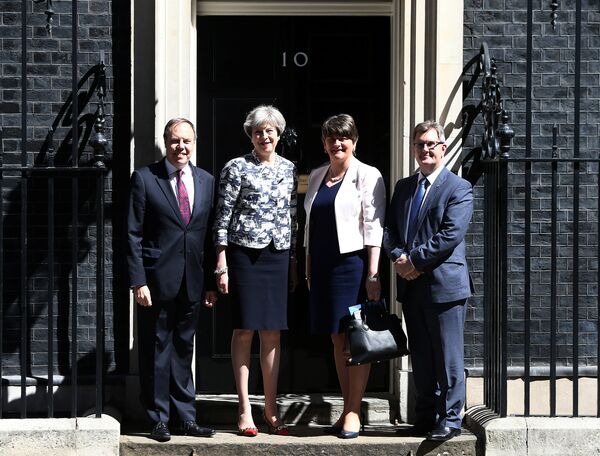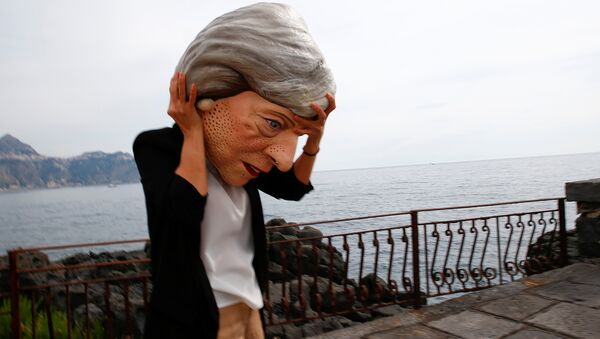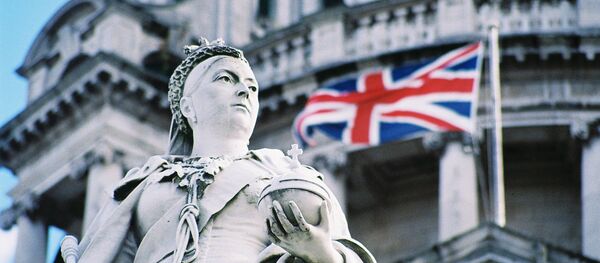The British Government is reportedly considering an agreement with the European Union whereby Northern Ireland will temporarily remain within the Customs Union after the rest of the United Kingdom has left.
The new Irish Deputy Prime Minister Simon Coveney on December 1 welcomed the reported proposal and confirmed to media outlets that Dublin was in talks with the Democratic Unionist Party (DUP) of Northern Ireland, which shares power with British Prime Minister Theresa May's Conservatives, on the proposals.
London's proposal would allow "Regulatory Convergence," or the adoption of EU industry standards by Northern Ireland, in an attempt to minimize the disruption of trade between it and the Republic of Ireland.
No Borders
The UK's influential cross-party Brexit Select Committee, which includes prominent Remain campaigners has had less praise for the proposal, saying in its report published November 28:
"We do not currently see how it will be possible to reconcile there being no border with the Government's policy of leaving the Single Market and the Customs Union, which will inevitably make the border between Northern Ireland and the Republic of Ireland the EU's customs border with the UK."
The report also criticized proposals for technological infrastructure to smoothen any border-checks as 'untested' and 'vague.' The Chairman of the committee, prominent Labour MP Hilary Benn shared its sentiments with the BBC on December 1.
"We want the negotiations to move on to phase two so we can talk about our future trade relationship. This is now a practical problem that needs to be solved. In the end, people are going to have to make a choice because if we're not in the Customs Union and the Single Market and heaven-forbid we don't get a trade deal, then that border will become the external border of the 27 EU member states with a third country which is what the UK will be," he said.
Tensions between and within the British and Irish Governments escalated on November 17 when Irish Prime Minister Leo Varadkar demanded London provide written assurances that no hard border will be erected between the Republic and Northern Ireland, threatening to veto any UK-EU trade agreement not excluding the possibility.
Ever-Higher Stakes
The political stakes were dramatically raised for Theresa May on November 30 when Democratic Unionist Party Member of Parliament Sammy Wilson, widely seen as representing the general sentiment within the organization, publicly warned that the DUP's continued support for the Conservative Government is conditional on the outcome of the negotiated status of Northern Ireland.
READ MORE: Northern Irish DUP and British Conservatives 'Desperate to Avoid Election'
3 options for Irish border.
— Andrea Catherwood (@acatherwoodnews) November 11, 2017
1. Hard border — no one admits to wanting tho' many suspect DUP do.
2. Special status for N Ireland — DUP propping up U.K. Govt are dead against.
3. All UK within customs union — unacceptable for Brexiteers.
Pick one.
Saying Northern Ireland could not fall under any customs regime separate from that governing the rest of the United Kingdom, the MP's position is directly at odds with the Government's reported proposal.
The DUP found themselves unexpected partners in power with the Conservatives after Britain's inconclusive general election on June 8,2017.
Having won only 317 seats, 10 short of the 327 required to govern, Mrs May was forced to reach an accommodation with the DUP to enable her to stay in power.

The agreement included at least US$1.35 billion (£1 billion) of funding for infrastructure and services in Northern Ireland which was criticized as the Prime Minister "bribing" the Unionists in order to cling onto the Prime-Ministership.
Negotiations between London and Brussels are set to resume at a summit on December 14.





